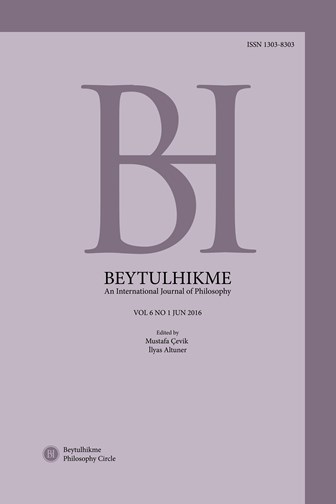Author :
Abstract
Heidegger felsefesinin en temel niteliği, bize göre monistik bir karakter arz etmesidir. Heidegger'de varlık, hiçlik, zaman, metafizik terimleri hep aynı ontolojik problemin farklı terminolojik veçheleri olarak karşımıza çıkar. Sadece varlığı anlamaya hasredilmiş bu felsefenin başyapıtı ise kuşkusuz Varlık ve Zaman'dır. Bu eserde Heidegger titiz, ancak önceki felsefelerden farklı bir perspektif ile varlık sorusunu ele alır ve varlığı anlamaya çalışır. Varlığın yanı başında duran diğer bir kavram ise hiçliktir. Hiçlik problemini ise Heideger, bir ders sunumu olan Metafizik Nedir? isimli küçük risalesinde irdeler. Ancak Metafizik Nedir?deki çözümlemelerin terminolojik arka planının önemli ölçüde Varlık ve Zaman'da olduğunu düşünüyoruz. Bu makalede filozofun Metafizik Nedir?’deki hiçlik çözümlemesi, Varlık ve Zaman’daki varlık çözümlemesi ile irtibatlı olarak ele alınıp anlaşılmaya çalışılacaktır.
Keywords
Abstract
The main feature of Heideger's philosophy is its monistic character. The terms Being, nothingness, time, metaphysics we face in Heidegger’s philosophy are various terminological aspects of the same ontological problem. His masterpiece which is specified to understand “Being” only is Being and Time. In this work, Heidegger deals with and tries to understand the problem of being in scrutiny but in a different way from the previous philosophies. The other term which cannot be separated from being is nothingness. Heidegger goes through in detail the problem of nothingness in his published lecture called What is Metaphysics? However we believe that the terminological background of analysis carried out in What is Metaphysics? is mostly in Being and Time. In this paper, Heidegger's analysis of nothingness will be studied in the context of analysis of being in Being and Time.
Keywords
- Heidegger, M. (1955). Was ist Metaphysik? Passau: Buchdruckerei Ag Passavia.
- Heidegger, M. (2003). Metafizik Nedir? (çev. M. Ş. İpşiroğlu & S. K. Yetkin). İs- tanbul: Kaknüs Yayınları.
- Heidegger, M. (2001). What is Metaphysics? (trans. T. Sheehan). The New Year Book For Phenomology and Phenomenological Philosophy (eds. B. Hopkins & S. Crowell). Seatle: Noesis Press.
- Heidegger, M. (2015). What is Metaphysics? (trans. M. Groth). https://wagner.edu/psychology/files/2013/01/Heidegger-What-IsMetaphysics-Translation-GROTH.pdf. Erişim Tarihi: 15.12.2015.
- Heidegger, M. (2010). Being and Time (trans. J. Stambaugh). Albany: State Univer- sity of New York Press.
- Heidegger, M. (2001). Being and Time (trans. J. Macquarrie & E. Robinson). Oxford: Blackwell Publishers Ltd.
- Heidegger, M. (2008). Varlık ve Zaman (çev. K. H. Ökten). İstanbul: Agora Kitap- lığı.
- Küçükalp, K. (2008). Batı Metafiziğinin Dekosntrüksiyonu: Heidegger ve Derrida. Bursa: Sentez Yayıncılık.
- Philipse, H.(1998). Heidegger's Philosophy of Being: A Critical Interpretation. New Jersey: Princeton University Press.
- Wahl, J. (1999). Varoluşçuluğun Tarihçesi (çev. B. Onaran). İstanbul: Payel Yayınla- rı.
- Yao, Z. (2010). Typology of Nothing: Heidegger, Daoism And Buddhism. Com- parative Philosophy, 1 (1), 78-89.
- Zimmerman, M. E. (1993). Heidegger, Buddhism, and Deep Ecology, The Camb- ridge Companion to Heidegger (ed. C. B. Guignon). New York: Cambridge University Press, 240-269. Öz: Heidegger felsefesinin en temel niteliği, bize göre monistik bir karakter arz etmesidir. Heidegger'de varlık, hiçlik, zaman, metafizik terimleri hep aynı ontolojik problemin farklı terminolojik veçheleri olarak karşımıza çıkar. Sadece varlığı anlamaya hasredilmiş bu felsefenin başyapıtı ise kuşkusuz Varlık ve Zaman'dır. Bu eserde Heidegger titiz, ancak önceki felsefelerden farklı bir perspektif ile varlık sorusunu ele alır ve varlığı anlamaya çalışır. Varlığın yanı başında duran diğer bir kavram ise hiçliktir. Hiçlik problemini ise Heideger, bir ders sunumu olan Metafizik Nedir? isimli küçük risalesinde irdeler. Ancak Metafizik Nedir?’deki çözümlemelerin terminolojik arka planının önemli ölçüde Varlık ve Zaman'da olduğunu düşünüyoruz. Bu makalede filozofun Metafizik Nedir?’deki hiçlik çözümlemesi, Varlık ve Zaman’daki varlık çözümlemesi ile irtibatlı olarak ele alınıp anlaşılmaya çalışılacaktır. Anahtar Kelimeler: Dasein, Heidegger, varlık, zaman, varolan, metafizik.





